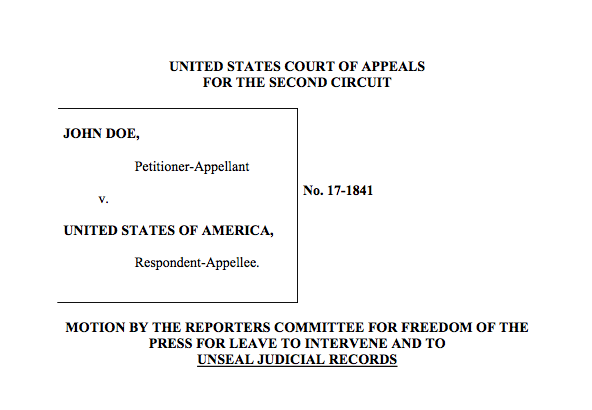Reporters Committee seeks to intervene and unseal court records in case before the Second Circuit

The Reporters Committee for Freedom of the Press filed a motion to intervene and unseal court documents in John Doe v. United States, a sealed criminal case in the United States Court of Appeals for the Second Circuit.
The court documents at issue relate to the prosecution of a criminal defendant proceeding under the pseudonym “John Doe” and his efforts to have his conviction vacated. On February 14, the Second Circuit issued a 26-page redacted opinion ordering the trial court to set aside Doe’s conviction and sentence on the grounds that the government had engaged in questionable conduct during its prosecution of Doe, and that Doe had received ineffective assistance from his attorneys.
The entirety of the record in John Doe’s appeal — including the identity of John Doe, his counsel, the attorneys representing the United States, the docket sheet, all legal briefing in the case, and even the district court from which the appeal originated — is under seal. In its filing, the Reporters Committee argues the criminal prosecution and appellate proceedings in this matter appear to have thus taken place “with no opportunity for public oversight of the conduct of prosecutors, defense counsel, or the courts.”
The only publicly available information about the case is found in the Second Circuit’s redacted opinion, which indicates that Doe pled guilty to a “one-count information charging him with conspiracy” at some point between 2002 and 2010. The opinion also indicates that Doe was convicted of an offense involving “fraud or deceit,” in which the loss to the victim(s) was greater than $10,000.
The Reporters Committee argues that unsealing in this matter is particularly important because the Second Circuit’s opinion indicates the government engaged in “troubling” conduct during Doe’s prosecution.
“This case,” argued the Reporters Committee, “underscores the importance of public access to ensuring Government accountability in criminal matters, and the public’s perception of the fairness and legitimacy of the criminal justice system as a whole.”
Specifically, the Second Circuit’s opinion points to “troubling changing positions” taken by the government in connection with Doe’s petition. Further, the Second Circuit held that Doe, who is not a U.S. citizen, received ineffective assistance of counsel because his attorney misadvised him as to the immigration consequences of his guilty plea.
The Reporters Committee’s motion argues the public has a constitutional and common law right of access to the records from these proceedings — including the docket sheet, a transcript or recording of the October 22, 2018 oral argument in the case, and the redacted portions of the publicly-issued opinion.
“The public’s right of access to proceedings and judicial records in criminal matters is deeply rooted in American history and an ‘indispensable attribute’ of our criminal justice system,” the Reporters Committee stated in the motion.
To get updates about this case and about cases like this, sign up for our monthly newsletter.